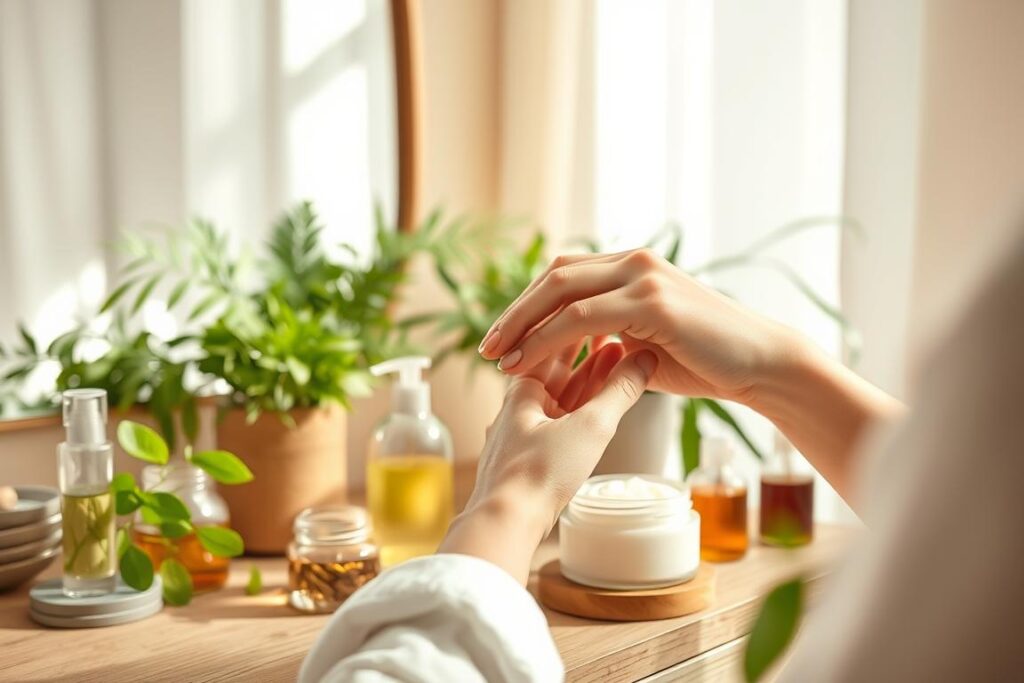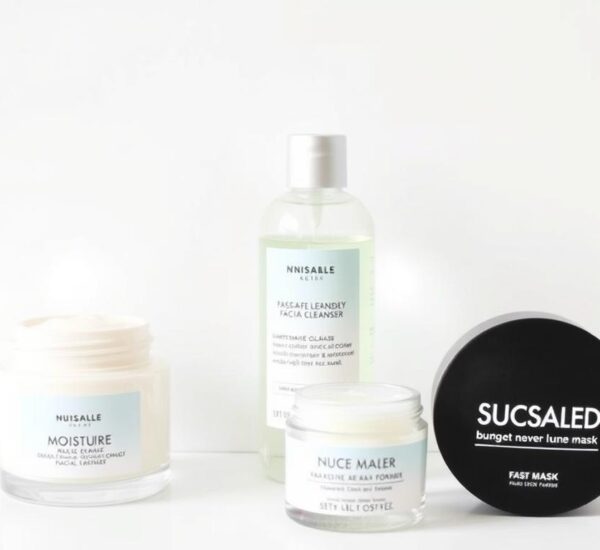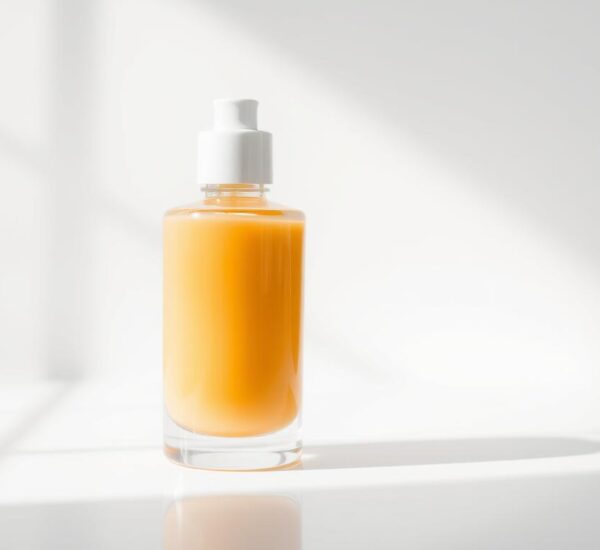Dealing with sensitive skin can be tough. It often causes redness, itchiness, and flare-ups. But, with the right steps, you can manage it and get glowing skin.
It’s key to know what causes sensitive skin. Things like the environment, genetics, and what we use on our skin matter. By finding these causes and using hypoallergenic skincare, we can work towards better skin.
Key Takeaways
- Identify the causes of your sensitive skin to better manage it.
- Choose gentle skincare products that are hypoallergenic.
- Maintain a consistent skincare routine.
- Protect your skin from environmental stressors.
- Consider consulting a dermatologist for personalized advice.
Understanding Sensitive Skin
To get a healthy and balanced skin, knowing about sensitive skin is key. It can be tough to handle, but the right steps can help. You can create a skincare routine that calms and guards your skin.
Signs and Symptoms of Sensitive Skin
Sensitive skin shows signs like redness, burning, dry patches, or breakouts. These can come from many things. Knowing what causes your sensitivity is the first step to a dermatologist-recommended skincare plan.
Common signs include:
- Redness and irritation
- Dryness and flakiness
- Itching and burning sensations
- Breakouts and acne
Common Triggers for Sensitivity
Knowing what makes your skin sensitive is important. Harsh products, the environment, and genetics are common culprits. Fragrances, dyes, and other harsh ingredients can harm your skin’s natural barrier. Extreme weather, pollution, and humidity can also make your skin sensitive.
Different Types of Sensitive Skin
Sensitive skin isn’t just one thing; it’s many types needing different care. The main types are dry, oily, and combination skin. Dry sensitive skin needs gentle, moisturizing products. Oily sensitive skin needs products that control oil without drying out the skin. Knowing your skin type is key to picking the right products and making a good skincare routine with fragrance-free skincare.
Choosing the Right Cleanser
## Choosing the Right Cleanser
For those with sensitive skin, finding a gentle cleanser is key to a healthy glow. The right cleanser cleanses and keeps the skin’s natural barrier strong. This ensures the skin stays healthy and resilient.
### Gentle Ingredients to Look For
When picking a cleanser, look for gentle ingredients that won’t irritate your skin.Sulfate-free and fragrance-free formulasare best for sensitive skin. They are less likely to cause irritation. Ingredients likegreen tea extractandaloe veraare soothing and beneficial.
Some cleansers have ceramides or hyaluronic acid. These help keep the skin’s barrier and hydration levels up. Always check the ingredient list when shopping for a cleanser.
### Cleansing Techniques for Sensitive Skin
How you cleanse your skin matters as much as the cleanser you use. Uselukewarm water instead of hot to keep your skin’s natural oils. Massage the cleanser onto your skin with your fingertips. Avoid using a washcloth or scrubbing too hard to reduce irritation.
Don’t over-cleanse or use harsh cleansers, as this can make your skin more sensitive. Make sure to rinse your face well to remove all residue. Pat dry with a towel instead of rubbing to avoid irritation.
### The Role of pH Balance
The pH balance of your cleanser is vital for your skin’s health. A cleanser that’s too alkaline or too acidic can upset this balance. This can lead to irritation and sensitivity.
| pH Level | Effect on Skin | Recommended? |
| — | — | — |
| Very Acidic (pH 7) | Can strip skin of its natural oils, leading to dryness and irritation. | No |
Opt for a cleanser with a pH level near your skin’s natural pH (around 5.5). This helps keep your skin’s barrier strong and reduces irritation risk.
By focusing on the right ingredients, cleansing techniques, and pH balance, sensitive skin can find a cleanser that supports its health. This cleanser will not only clean well but also care for your skin.
Exfoliation Best Practices
Exfoliating sensitive skin is all about finding the right balance. It helps remove dead skin cells while keeping the skin’s natural barrier intact. Exfoliation is vital for any skincare routine, as it unclogs pores and improves skin texture.
Choosing the right exfoliation method is critical for sensitive skin. There are two main types: chemical and physical exfoliants. Chemical exfoliants, like alpha-hydroxy acids (AHAs) and beta-hydroxy acids (BHAs), break down dead skin cells gently. In contrast, physical exfoliants use small particles or tools to remove dead skin cells manually.
Chemical vs. Physical Exfoliation
Chemical exfoliants are often better for sensitive skin because they are less irritating. AHAs, such as glycolic acid and lactic acid, improve skin texture and tone. BHAs, like salicylic acid, are great for acne-prone skin because they penetrate deep into pores.
Start with a low concentration of chemical exfoliants and gradually increase as your skin gets used to it. Physical exfoliants, when used gently, can also be effective. The key is to be gentle and not over-exfoliate.

How Often to Exfoliate
The frequency of exfoliation depends on your skin type and concerns. Start with once a week for sensitive skin and increase to twice or thrice if your skin can handle it. Over-exfoliating can cause irritation, dryness, and infections, so listen to your skin and adjust your routine as needed.
Recommended Products for Sensitive Skin
When selecting exfoliating products for sensitive skin, choose hypoallergenic and dermatologist-recommended options. Look for products with soothing ingredients like aloe vera or green tea. Some great chemical exfoliants for sensitive skin include lactic acid or gentle enzyme exfoliants.
By being thoughtful in your exfoliation approach, using the right products, and respecting your skin’s limits, you can enjoy its benefits without the drawbacks. This balanced approach is essential for maintaining healthy, radiant skin.
Hydration Strategies for Sensitive Skin
Hydration is key for sensitive skin. Keeping the skin’s barrier strong is important. This can be done with the right hydration strategies. Sensitive skin needs careful product and technique choices to avoid irritation and look radiant.
Importance of Moisturizers
Moisturizers are vital for keeping the skin hydrated. They lock in moisture and protect against environmental stress. For sensitive skin, choose a fragrance-free and non-irritating moisturizer. A good one helps keep the skin’s barrier strong, reducing irritation and discomfort.
Key Ingredients for Sensitive Skin Hydration
Some ingredients are great for hydrating sensitive skin. Hyaluronic acid holds moisture well, and ceramides repair the skin’s barrier. Glycerin and niacinamide also soothe and calm the skin. Look for these ingredients in your products for better hydration.
How to Layer Your Products
Layering products right is key for hydration. Start with a gentle cleanser, then a toner to balance pH. Next, use a serum with hyaluronic acid or ceramides. Finish with a moisturizer. For extra hydration, add a homemade rosehip oil serum to your routine. It hydrates and offers anti-aging benefits.
| Product | Key Ingredient | Benefit |
|---|---|---|
| Moisturizer | Hyaluronic Acid | Retains moisture |
| Serum | Ceramides | Repairs skin barrier |
| Toner | Glycerin | Soothes and calms |
Sunscreen and Sensitive Skin
Protecting sensitive skin from the sun’s harsh rays is key. The right sunscreen makes a big difference. We’ll look at why sunscreen is important for sensitive skin, the difference between mineral and chemical sunscreens, and how to apply sunscreen right.
Why Sunscreen is Essential
Sunscreen does more than prevent sunburn. It protects sensitive skin from damage. UV rays can cause premature aging, dark spots, and even skin cancer. For sensitive skin, a gentle and effective sunscreen is vital. Choose sunscreens that are “hypoallergenic” or “fragrance-free” to avoid irritation.
Using sunscreen for sensitive skin has many benefits:
- Protection against UV damage
- Reduced risk of premature aging
- Prevention of sunburn
- Lower risk of skin cancer
Mineral vs. Chemical Sunscreens
There are two main sunscreen types: mineral and chemical. Mineral sunscreens use zinc oxide or titanium dioxide to reflect UV rays. Chemical sunscreens absorb UV rays and release heat from the skin.
Mineral sunscreens are better for sensitive skin because they’re less likely to irritate. But, some people prefer chemical sunscreens. It’s important to find what works best for you.
Tips for Applying Sunscreen
Applying sunscreen correctly is as important as choosing the right type. Here are some tips to get the most from your sunscreen:
- Apply sunscreen 15-30 minutes before going outdoors.
- Use enough sunscreen to cover all exposed skin (about one ounce per application).
- Reapply sunscreen every two hours or immediately after swimming or sweating.
- Don’t forget to apply sunscreen to often-overlooked areas, such as the tops of your ears and the back of your neck.
By following these tips and choosing a gentle, hypoallergenic sunscreen, you can enjoy the sun while protecting your sensitive skin.
Nutritional Support for Healthy Skin
Healthy, radiant skin comes from more than just skincare. It also needs nutritional support from inside. The foods we eat and supplements we take are key to keeping our skin healthy and strong.
Foods That Benefit Sensitive Skin
Some foods can help with sensitive skin. Foods rich in omega-3 fatty acids, like salmon and walnuts, are great. They help lower inflammation. Foods high in antioxidants, like berries and leafy greens, fight off free radicals that harm skin cells.
Eating foods with vitamin C, like citrus fruits and bell peppers, boosts collagen. This makes skin more elastic. Eating a variety of whole foods gives our skin the nutrients it needs.
| Food | Nutrient | Benefit to Skin |
|---|---|---|
| Salmon | Omega-3 Fatty Acids | Reduces inflammation |
| Berries | Antioxidants | Combats free radicals |
| Citrus Fruits | Vitamin C | Boosts collagen production |
The Role of Hydration
Drinking enough water is key for skin health. It keeps the skin’s barrier strong and reduces irritation. Aim for at least eight glasses of water a day. Your needs might change based on how active you are and where you live.
Supplements to Consider
Some supplements can also help skin health. Omega-3 fatty acid supplements can fight inflammation. Vitamin D supplements support skin health too. But, always talk to a doctor before starting any supplements to make sure they’re right for you.
Effective Anti-Aging Solutions
Sensitive skin needs a careful approach to anti-aging. We focus on gentle yet effective solutions. As we age, our skin changes, leading to fine lines, wrinkles, and less glow. But, with the right products and strategies, we can look younger without harming our skin.
Safe Ingredients for Sensitive Skin
Some ingredients are great for anti-aging and gentle on sensitive skin. Retinol comes from vitamin A and helps cells turn over and collagen grow. This reduces wrinkles. Peptides also boost collagen and make skin more elastic.
Hyaluronic acid deeply hydrates the skin. Antioxidants protect against environmental damage and keep skin healthy. Look for products that mix these ingredients safely for sensitive skin.
| Ingredient | Benefits | Suitability for Sensitive Skin |
|---|---|---|
| Retinol | Promotes cell turnover, reduces fine lines and wrinkles | Generally considered safe when used in low concentrations |
| Peptides | Stimulates collagen production, improves skin elasticity | Highly suitable due to their gentle nature |
| Hyaluronic Acid | Provides intense hydration | Very suitable as it is naturally found in the skin |
How to Approach Anti-Aging Products
Start slow when adding anti-aging products to your routine. Begin with a small amount of active ingredients. Gradually increase as your skin gets used to it. This reduces the chance of irritation and helps your skin adjust.
Always patch test new products. Apply a small amount to a hidden area and wait 24 to 48 hours. This checks for any bad reactions.
Alternative Treatments
Looking beyond creams and serums? Chemical peels and microdermabrasion are great options. Peels remove top skin layers for smoother, brighter skin. Microdermabrasion exfoliates to improve texture and reduce lines.
These treatments need a pro to do them safely, even for sensitive skin. Always talk to a dermatologist or skincare expert to find the best treatment for you.
Managing Skin Conditions
For people with sensitive skin, dealing with eczema, rosacea, and acne is tough. These issues not only change how your skin looks but also make it uncomfortable and stressful.
Eczema and Rosacea Strategies
Strategies for Eczema and Rosacea
For eczema and rosacea, you need gentle, hypoallergenic skincare. Look for products without fragrances and made for sensitive skin. Keeping your skin moisturized is key for eczema. For rosacea, stay away from extreme temperatures and certain foods.
For more tips on eczema, check out this resource. It has natural remedies that dermatologists recommend.
Tips for Dealing with Acne
Acne is hard to handle because it needs both gentle skincare and other treatments. Use products labeled ‘acne-friendly’ or ‘oil-free’. Blue light therapy is also effective.
Remember, don’t pick or pop pimples. This can make things worse and cause scars.
Seeking Professional Guidance
Seeking Professional Help
Getting help from a dermatologist is key for managing skin issues. They can give you advice and treatments that fit your skin. They help find what triggers your problems and create a skincare plan just for you.
By working with a dermatologist and using gentle skincare, you can manage your skin. This will help you get a healthier, brighter look.
Seasonal Changes and Sensitive Skin
It’s important to know how seasonal changes affect our skin. As the seasons change, so do the challenges for our skin. The change in temperature and humidity can disrupt our skin’s natural barrier, leading to irritation and other issues.

Adjusting Your Routine Year-Round
To keep sensitive skin healthy, we need to adjust our skincare routine with the seasons. In the winter, a more moisturizing product can help combat dryness. In the summer, a lighter product can prevent clogged pores.
- Use a fragrance-free cleanser to minimize irritation.
- Apply a non-irritating moisturizer suited to the current season.
- Consider a soothing skincare routine that includes calming ingredients like aloe vera or chamomile.
Protective Measures in Different Climates
Protecting our skin from the elements is vital. In harsh climates, whether it’s the cold of winter or the intense sun of summer, taking protective measures can significantly reduce the risk of irritation.
- Wear protective clothing to shield your skin from extreme weather conditions.
- Seek shade, specially during peak sun hours, to prevent sun damage.
- Use a broad-spectrum sunscreen with a suitable SPF for your skin type.
Impact of Indoor Heating and Cooling
Indoor heating and cooling systems can dry out the skin, making it more sensitive. Using a humidifier can help maintain a balanced moisture level in the skin.
By adjusting our skincare routine, taking protective measures, and being mindful of our indoor environment, we can minimize the impact of seasonal changes on our sensitive skin.
Lifestyle Tips for Skin Health
Getting healthy, glowing skin is more than just using the right products. It’s about living a lifestyle that supports your skin. Our daily habits and choices are key to keeping our skin healthy, even for those with sensitive skin.
Managing Stress for Better Skin
Stress can really affect our skin, making problems like acne and rosacea worse. Stress management techniques are vital for skin health. Activities like meditation and yoga can lower stress and improve overall health.
Starting your day with yoga can boost blood flow and set a positive mood. Learn more about morning yoga for better skin by visiting our guide on morning yoga poses.
The Importance of Sleep
Sleep is essential for skin recovery and health. While we sleep, our skin repairs and rejuvenates itself. Getting enough sleep helps keep our skin’s barrier strong and reduces wrinkles.
Creating a Balanced Skincare Routine
A good skincare routine is vital for sensitive skin. Use gentle skincare products that fit your skin type. Avoid harsh ingredients and don’t over-exfoliate.
Layering your products right is also important. For sensitive skin, choose hypoallergenic products to lower the risk of allergic reactions.
| Lifestyle Tip | Benefit for Sensitive Skin |
|---|---|
| Stress Management | Reduces inflammation and promotes relaxation |
| Adequate Sleep | Allows skin to recover and repair itself |
| Balanced Skincare Routine | Maintains skin’s natural barrier and reduces irritation |
Testing Products Before Use
Before adding new skincare products to your routine, it’s key to test them first. This is very important for people with sensitive skin. They might react to certain ingredients.
Understanding the Importance of Patch Testing
Patch testing is a simple yet effective way to see if a product is good for your skin. Apply a small amount to a discreet area to watch for reactions. It helps avoid irritation. We suggest using soothing skincare and fragrance-free products to lower irritation risks.
Recognizing Allergens and Sensitivities
Knowing common allergens and sensitivities is important when picking skincare products. Look for ingredients that might cause reactions. Choose products labeled as hypoallergenic or recommended by dermatologists. If you’re unsure, talk to a dermatologist for advice.
Seeking Professional Help
If you keep getting irritation or discomfort, see a dermatologist. They can find out what’s causing your skin issues. They’ll suggest treatments and a skincare routine that fits your skin type.



